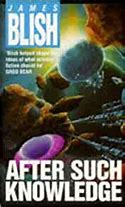James Blish's Haertel Scholium comprises:
(i) four stories collected in Galactic Cluster, the first featuring Adolph Haertel;
(ii) five novels - one about Haertel, the others referring to him;
(iii) four more shorter works, three stories collected in Anywhen and the short novel, Midsummer Century.
(i) A linear trilogy:
"Common Time"
"Nor Iron Bars"
"This Earth of Hours"
- and an offshoot, "Beep," which is a further development of the idea of the instantaneous Dirac transmitter which had been introduced in Blish's Cities In Flight Tetralogy.
(ii) (a) Three juvenile novels:
Welcome To Mars, about Haertel;
The Star Dwellers and Mission To The Heart Stars, both about Jack Loftus.
(b) A Case Of Conscience, which is Volume III of the After Such Knowledge Trilogy.
(c) The Quincunx Of Time, a (still short) novelization of "Beep."
(iii) Each of the four remaining shorter works connects with one of the novels:
"No Jokes on Mars" with Welcome To Mars;
"A Dusk of Idols" with The Star Dwellers;
"A Style in Treason" and Midsummer Century with The Quincunx Of Time.
Midsummer Century, written while Blish was expanding "Beep," is a companion volume to The Quincunx... The two volumes cross-refer and are linked by a Dirac message.
Everything comes together.






